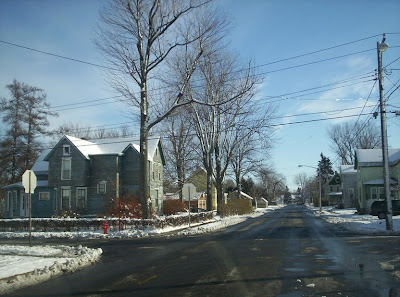
_____
On her last evening in Australia, Danielle Minkoff, who has been there to research a television program on the Aborigines, attends a dinner party in Sydney hosted by Lucy Leverett and her husband, Roger. There she meets Ludovic Seeley, who is about to move to New York to edit a magazine, The Monitor, owned by the Australian media magnate Augustus Merton (think Rupert Murdoch). Lucy Leverett owns a gallery that specializes in Aboriginal art, and Roger, her friends Moira and John tell her, is a novelist -- not a good one but celebrated and powerful in Australia. Danielle realizes what that means, and says:"There's a nasty-looking little Chinese restaurant in the East Village with a handwritten sign in the window -- a dirty window, too -- that says 'our chef is very famous in London.' But not in New York, or anywhere outside of London."
"And probably not in London either, eh?" John had said, as they approached the Leveretts' front door.
"Roger Leverett is very famous in Sydney, sweetheart, whatever you say."
Danielle finds Roger Leverett to be "jovial and solicitous" but also "a narcissist, delighted by the sound of his own voice and the humor of his own jokes." Ludo Seeley speaks with an "Australian inflection so slight as to be almost British.... His face, so distinctive, struck her as that of a nineteenth-century portrait, a Sargent perhaps, an embodiment of sardonic wisdom and society, of aristocratic refinement."
Danielle herself is a New Yorker, though she grew up in Columbus, Ohio. "There was, for Danielle Minkoff, only New York. Her work was there, her friends were there -- even her remote acquaintances from college at Brown ten years ago were there -- and she had made her home in the cacophonous, cozy comfort of the Village."
 |
| Watertown, New York |
Judy is trying to get her bookish, overweight son to get up and help her shovel snow. "He'd been a chubby boy, and bespectacled, but always respected, even admired, in a funny way. He'd been valedictorian." After he graduated from high school last year, he went off to the state university at Oswego, but came "home at Christmas with twenty or thirty pounds on him and a fistful of incompletes saying that college was bullshit, or at least Oswego was bullshit, that his teachers were morons and he wouldn't go back." So Judy tackles the snow-shoveling herself until it guilts her son into coming out and finishing the job.
 |
| Stockbridge, Massachusetts |
She has been working alone, but the solitude has caused her to have anxiety attacks, so she has summoned her friend Julius Clarke to stay with her. She would have called Danielle to stay with her, but Danielle is in Australia. Now she and Julius are getting on each other's nerves. He is massaging her feet and is trying to decide whether he is Pierre or Natasha in War and Peace: "the solitary, brooding loner or the vivacious social butterfly." The debate is brought on by his breakup with a boyfriend. Marina has also broken up with the man she had been living with, "Al -- Fat Al, her friends called him, because he had a belly on him, of which she had claimed to be fond." She had been "the most settled among her friends" and was now the least. Her father, Murray Thwaite, had initiated the book project by arranging for her to meet with "a powerful editor." She was now on the third editor, and her mother had suggested the retreat to Stockbridge to finish the book.
Julius was from Danville, Michigan. His father, Franklin Clarke, "had been a Green Beret in Vietnam, which was where he had met Thu, Julius's mother, after whom the boy took." Julius and his two sisters were all "dark and wide-eyed and frail like their mother," whereas their father was "A big, physically awkward man with a square head and jowls." But even after learning that his son was gay -- "Julius had been a fruit from the beginning, and was teased as a sissy in grade school -- tough Frank doted as much upon his boy as upon his more conventionally successful daughters." When he visited Julius in the East Village and went out to dinner with him, Julius realized that his father looked "like his son's suburban john, a married sugar daddy getting a bit of boy on the side."
Julius had become a successful critic just out of college at Brown, where he had made friends with Marina and Danielle, by sashaying "into the office of the Village Voice -- with a youthful certainty that attitude could carry him. And for a long time, it had.... His devastating but elegant book reviews were often cited; his less devastating but no less elegant film and television reviews rather less so; but still: throughout his twenties, he lived a life of Wildean excess and insouciance.... He was aware that at thirty he stretched the limits of the charming wastrel, that some actual sustained endeavor might be in order were he not to fade, wisplike, away: from charming wastrel to needy, boring failure was but a few, too few, short steps."
Marina, feeling entitled, never really asked herself if she was good enough. Whereas he, Julius, asked himself repeatedly, answered always in the affirmative, and marveled at the wider world's apparent inability to see the light. He would have too show them -- of this he was ever more decided, with a flamelike conviction. But he was already thirty, and the question was how?So much for exposition: We have met Danielle, Marina, and Julius, as well as the so-far apparently only tangentially related Judy and Bootie Tubbs. Now we wait to see how their stories merge and develop.
No comments:
Post a Comment